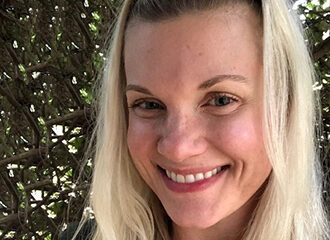Written by: Cecilia Perez-Zamora, LCPC
Team Leader at The Renfrew Center of Bethesda
 Breaking the Myth
Breaking the Myth
There are many myths surrounding eating disorders, particularly regarding how they present and who they impact. There is a stereotype that eating disorders have a certain “look” and only impact wealthy, white, teenage girls. Many people believe that eating disorders are a “phase” that someone will eventually “grow out of.” In reality, eating disorders do not discriminate and can impact anyone regardless of age, race, gender, body size, sexuality, or socioeconomic status.
While it is true that eating disorders often emerge during teenage years, they can develop at any age and rarely resolve on their own without treatment. There are many individuals in midlife and beyond living with an eating disorder. These misconceptions minimize how dangerous eating disorders can be and contribute to a stigma that prevents individuals from seeking the support they need. The good news is that recovery is possible at any age.
Why Midlife Recovery Is Unique
Midlife brings a unique set of challenges that can contribute to eating disorders resurfacing or developing. During this stage of life, individuals are experiencing significant transitions, such as physical changes, career pressures, caring for aging parents, or experiencing empty-nest syndrome. These changes can significantly impact one’s sense of identity and control. The emotions that come with feeling out of control or lacking purpose can be very painful and difficult to manage.
In response to these changes, individuals may turn to behaviors and routines that provide a sense of structure and can serve as a distraction from uncomfortable feelings. Eating disorders often develop by providing a false sense of control during periods of instability. At their core, eating disorder behaviors function as a way to numb or escape emotions many of us would rather avoid. However, emotional avoidance is unsustainable in the long term because it is impossible to completely suppress our emotions.
LEARN MORE: Eating Disorders in Middle Age: Types, Risks & Treatment Options
Common Challenges People Face
We live in a society that places a high value on youth and thinness. We are surrounded by marketing that targets our insecurities by promoting diet culture— a belief system that equates thinness with moral superiority and happiness. Diet culture normalizes disordered behaviors, such as food restriction and over-exercising, which can make eating disorders difficult to detect and diagnose.
As we age and our bodies naturally change, we may feel increased pressure to control how, or even if, our bodies change. People are often praised for weight loss through extreme measures, particularly in midlife. This can lead to confusion and conflicting emotions when someone begins to recognize that their behaviors may be harmful or are no longer serving them. Naturally occurring body changes can also affect parts of our appearance tied to our identity, increasing the desire to somehow stop the changes or return to our younger body.
Additionally, many people do not believe they are “sick enough” to receive treatment. There is a common misconception that a diagnosis or treatment is only necessary if someone is underweight or experiencing medical complications. In reality, less than six percent of people diagnosed with an eating disorder are medically underweight, and many have normal labs and EKG results. Many midlife adults grew up hearing misleading information about eating disorders and may not even recognize that they are struggling.
Struggles with food and weight are often misinterpreted as a failure of willpower based on the messaging we receive through diet culture. Negative self-talk, combined with the stigma of having an eating disorder in midlife, can lead to shame, especially for those who feel like they “should” have outgrown it by now. Long-held stereotypes that eating disorders only affect teenagers make it harder for midlife adults to acknowledge their condition and seek treatment.
Seeking treatment in midlife also presents some practical challenges. Increased responsibilities, including caring for children or aging parents, work stressors, financial obligations, and managing a household, can make it difficult to dedicate time to treatment. Treatment programs often require a significant time commitment, which can feel overwhelming when balancing all of these different obligations. In addition, there are fewer treatment programs that are tailored to midlife and older adults.
Strengths That Come with Midlife Recovery
While there are barriers to treatment in midlife, there are also many advantages. Individuals at this stage in life tend to be more aware of their individual needs, strengths, and triggers, which can enhance the effectiveness of their treatment. Life experience can contribute to resilience and problem-solving abilities. Navigating both the struggles and successes of life provides midlife adults with a broader range of experiences to call upon to support their recovery.
Additionally, individuals in midlife tend to enter treatment with strong intrinsic motivation, as they are choosing to live a healthier and more fulfilling life by choice. This motivation can lead to more commitment to treatment and recovery, increasing the likelihood of a long-lasting recovery rather than cycles of treatment and relapse.
Strategies for Success
Recovery in midlife is possible! While treatment in midlife poses unique challenges, it does not limit a person’s ability to recover from an eating disorder. Here are several strategies to promote a successful recovery:
- Find a therapist or treatment program that understands midlife concerns. Working with a treatment team (therapist, dietitian, and psychiatrist) that specializes in eating disorders and understands the common challenges of midlife can be extremely beneficial.
- Address co-occurring challenges in midlife, such as chronic health conditions, career changes, or menopause. Working toward full recovery also involves reconnecting with your body and caring for it. Recognizing, understanding, and addressing any underlying medical conditions can be an important part of treatment. It can also be helpful to learn more about the natural physical changes that can occur in your body during this stage of life.
- Build a supportive community with peers who “get it.” Feeling connected to others and knowing that you are not alone in your struggle can be a healing part of recovery. Consider joining support groups tailored to adults, such as Renfrew’s Adult Connections: A Renfrew Support Group, or find other communities that support your own unique experiences.
- Challenge diet culture and anti-aging pressures that reinforce disordered behaviors. Educate yourself about diet culture and anti-aging messages, particularly targeted at those in midlife, through books, podcasts, and research articles.
- Practice body neutrality by remembering that it is normal for bodies to change over time. Reframing your thoughts can be beneficial— try shifting the focus from how your body looks to what your body allows you to do. Our bodies have carried us through countless experiences and deserve to be treated with kindness and respect.
Resources for Moving Forward
The best time to start your recovery is now. There may never be a “perfect” time for treatment, but you are always worthy of care. The Renfrew Center offers multiple levels of care, including residential, day treatment, and intensive outpatient programs. For individuals 30 and older, Renfrew offers a virtual support group called Adult Connections: A Renfrew Support Group, which meets bi-weekly on Wednesdays. Additionally, Renfrew alumni can access a texting service for those who are seeking additional support.
Conclusion: A Message of Hope
You are worthy of recovery at any age. Seeking treatment in midlife can offer many benefits, including improved physical health, increased emotional regulation, and deeper social connection. Taking the first step in seeking treatment is intimidating, but it is a necessary part of achieving lasting healing.
If you or a loved one is struggling, The Renfrew Center is here to help. With the right support, healing and progress are possible – every step forward is meaningful, and hope is always within reach. The Renfrew Center provides compassionate care for all bodies. Contact us today to get started.
If you, a loved one, or a patient is experiencing an eating disorder, help is available. Contact The Renfrew Center’s team by phone at 1-(800) 736-3739 or complete our online form.



